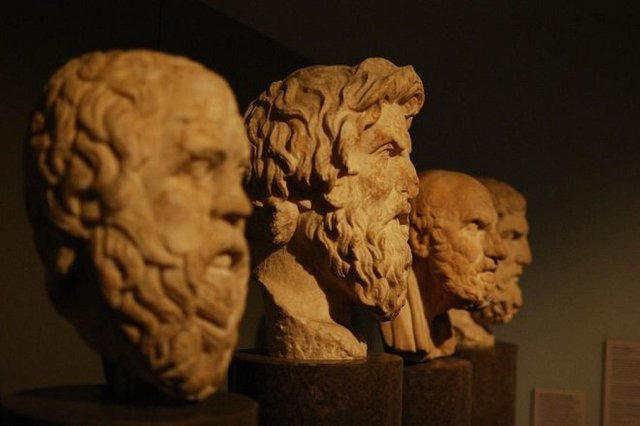Ancient philosophy. Life and creativity of Socrates. /part 6/
For Socrates, philosophy is not an entertaining fun, but a kind of sacred action. "The Athenian sage is all permeated by faith in the gentle sense of human existence. He only speaks that this meaning is not on the surface of things, but is set as a task ". Truth is not a static feature. It is a process that is directly related to life, its meaning, and creative urge. It can not be given as a prescription, as a prescription for the implementation of literal rules of conduct, such as case studies.
Every life situation - historically unique, as well as human individuality - raises crucial questions, for which one must freely find a creative solution as a task in understanding the reality, "Know yourself!" This famous maxim, attributed to the Spiridon Chilon, one of the seven wise men of ancient Greece, and then placed as the inscription of the Delphic temple, the Socratic philosophy is introduced to a basic method of knowledge. Explore everything in yourself that you have as knowledge, as a view of reality and man. Know your humanity! This is the responsibility of man before God, before society, before his own conscience. It is an insight into the meaning, that is, a self-consciousness in which there is no cabinet methodicality but an immediate faithful sense that at some point you are either human or against humanity.
Or you are a simple selfish consumer of goods, or you are involved in the overestimation - still here on this land - in a piece of truth, righteousness and beauty in life. The progression of true humanity means the confirmation of the divine beginning in man. Thus the Socratic method of self-knowledge leads to religious-philosophical and theological conclusions. Inspiration in man as "microcosm" solves many questions about the "macrocosm". The truths achieved in the way of self-knowledge related to the meaning of the purpose of man are based on the Highest Blah / agathon /, which has an unconditional and universal character. Theology derives from Socrates' entire philosophy. As he himself has stated in his "Apology", a man conscious of the lowness of his knowledge recognizes the infinite and unconditional nature of the perfect Divine Knowledge (13). A man, recognizing that he knows nothing, has an understanding of what true and perfect knowledge is. If there is any conditional knowledge, if there is knowledge at all, then we need to come to the idea of unconditional, absolute knowledge. All Socrates wisdom is nothing but recognition of the Divine Wisdom.

Inspiration in man as "microcosm" solves many questions about the "macrocosm". It could be the solutions. nice part 👍
You got a 11.24% upvote from @emperorofnaps courtesy of @godflesh!
Want to promote your posts too? Send 0.05+ SBD or STEEM to @emperorofnaps to receive a share of a full upvote every 2.4 hours...Then go relax and take a nap!
Voted